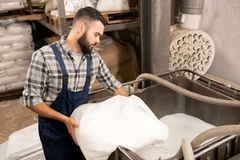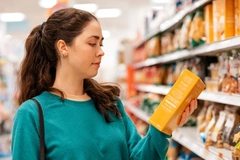Pringles can needs redesign not “fudge” recycling scheme, says UK Recycling Association exec

06 Nov 2018 --- The UK Recycling Association has criticized Kellogg’s Pringles can recycling scheme, referring to it as a “fudge that doesn’t solve any issues.” Kellogg’s announced last month that it had entered an agreement with recycling company TerraCycle, enabling consumers to recycle Pringles cans using Freepost labels, with the sender rewarded with a charitable donation for each can which can be redeemed at a school, charity or non-profit of choice. The cans are then recycled and the resulting pellets used to create new products such as benches and fence posts.
However, the TerraCycle scheme is not sufficient, according to the UK Recycling Association Chief Executive, Simon Ellin, who instead advocates for a new Pringles can with recyclability designed-in.
“Pringles cans still a nightmare to recycle”
Ellin tells PackagingInsights: “We have been very vocal about designing packaging for recyclability and circularity and the industry has made great progress. However, the Pringles scheme is a fudge, because while the tube is being recycled, it is still complex in design and complex to recycle. We want consistent, easy to recycle at home packaging. And the fact that the public has to post it, it simply won’t happen in significant quantities.”

“We need to be making it easier for the public, not harder. Being candid, it strikes me that Kellogg’s/Pringles have had lots of bad publicity and so has come up with a ‘make do’ scheme to try and advertise its sustainability credentials. They have got it wrong again.”
Ellin also states concerns that the postal nature of the scheme will increase carbon footprints. “It is absolutely an issue, both for the public and for TerraCycle,” he adds. “It’s an all-around daft idea if we’re being totally honest,” he says.
As an alternative, Ellin recommends a 100 percent fiber tube and gives the example of Walkers Stax tube which is essentially the same product. Ellin comments that the UK Recycling Association is not concerned by a thin foil strip to seal the tube and a food-safe liner if that means most of the packaging can be recovered while it is easy for the public to understand.
“The solution to turn them into pellets to be used in benches and fence posts isn’t circular by reusing the plastic again in the packaging,” Ellin continues. “Plus, Kellogg’s hasn’t mentioned what is happening to the paper and metals that make up the majority of the packaging. Is this going to be recycled as part of this process?”
“We have written to Kellogg’s offering to work with them on making Pringles containers fully recyclable, but did not receive a response. Kellogg’s need to do the right thing and redesign the packaging so that the consumer can place it in the recycling bin.”
“The public increasingly wants simple packaging solutions that they know can go in the recycling bin. Kellogg’s should provide a fully recyclable container as soon as possible to meet this demand,” he explains.

At the time of the announcement, a Kellogg’s spokesperson told PackagingInsights: “Within the complex Local-Authority-based public recycling infrastructure in the UK, Pringles cans are not currently recyclable, so the Pringles and TerraCycle partnership provides a consistent nationwide solution for all of our consumers. We are also working with TerraCycle to set up public access collection points so that consumers have more opportunities to recycle their Pringles cans.”
Read more about the Kellog’s-TerraCycle recycling scheme here.
“A good idea”: Colgate-TerraCycle recycling scheme
In another TerraCycle collaboration, Colgate has partnered with the UK recycling company to enable consumers to recycle notoriously “difficult to recycle” oral care products and packaging in exchange for free, while raising funds for the school, charity or non-profit of the senders choice.
In the new Oral Care Recycling Programme, TerraCycle will receive toothbrushes, toothpaste tubes and caps, outer packaging and cartons. They will be separated by composition, shredded and melted into hard plastic pellets that can be remolded to make new recycled products such as benches and construction applications, which reduces the need to create new virgin plastics. The paper from the cartons will also be shredded to make new paper.
On this scheme, Ellin was more positive, telling PackagingInsights: “Other than the cardboard outer which can be recycled in conventional systems, this strikes me as a good idea in a problem area with no real alternatives unless someone comes up with a really clever design.”
“Returning the used tube by post has the same issues as the Pringles scheme, in terms of quantities returned and carbon emissions resulting from transport, however, it does provide a route for recycling. Pringles are different because the tubes could easily be recycled at home with some very simple redesign.”

Read more about the Colgate-TerraCycle recycling scheme here.
Ellin concludes by referring to the UK Plastics Pact, a commitment to create 100 percent recyclability by design, which most UK retailers and manufacturers are signatories to. He says that the widely understood goal of this pact makes “Kellogg’s fudge all the more extraordinary.”
In September, PackagingInsights spoke to Simon Ellin about how UK recycling has been shaken by a string of Asian countries banning or restricting the import of post-consumer plastic and mixed paper grade. Read the interview here.
Also in September, PackagingInsights spoke with Mike Jackson, a board member of the UK Recycling Association, during Packaging Innovations 2018 in London, to discuss a number of pressing issues including the effects of China’s plastic waste import ban, the role of bioplastics, packaging design for recycling, consumer education and the need for simplified recycling symbols.
By Joshua Poole










